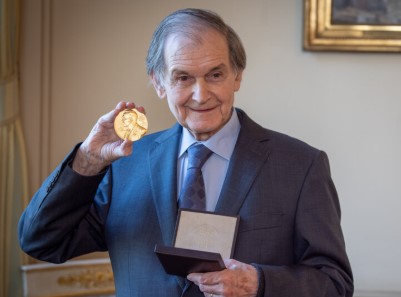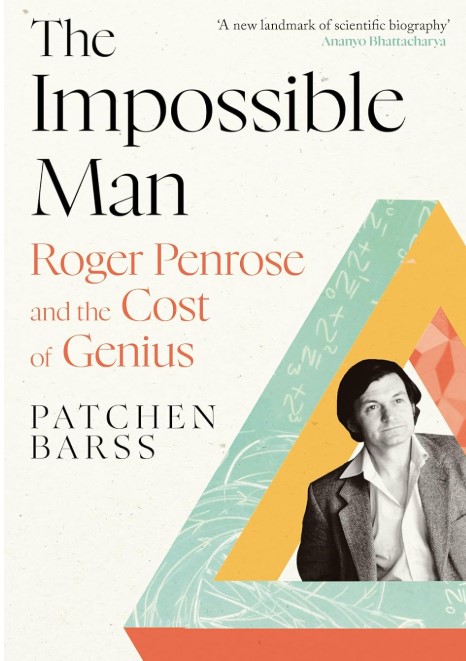In this episode of Biographers in Conversation, Patchen Barss chats with Dr Gabriella Kelly-Davies about his choices while crafting The Impossible Man: Roger Penrose and the Cost of Genius, the biography of Nobel Prize–winning physicist Roger Penrose.
A New Yorker Best Book of 2024
A Globe and Mail Best Book of 2024
A Financial Times Best Book of 2024
A Kirkus Best Book of 2024
A Daily Telegraph Best Book of 2024
The Impossible Man
When he was six years old, Roger Penrose discovered a sundial in a clearing near his house. Through that machine made of light, shadow and time, Roger glimpsed a ‘world behind the world’ of transcendently beautiful geometry. It spurred him on a journey to become one of the world’s most influential mathematicians, philosophers and physicists.
Roger Penrose would prove the limitations of general relativity, set a new agenda for theoretical physics, and astound colleagues and admirers with the elegance and beauty of his discoveries. However, as Patchen Barss documents in The Impossible Man, success came at a price: He was attuned to the secrets of the universe, but struggled to connect with loved ones, especially the women who care for and worked with him.

Roger Penrose, Nobel Prize 2020 Roger Penrose showing his Nobel Prize medal.
© Nobel Prize Outreach.
Photo: Fergus Kennedy
Making Science Accessible and Relatable
Praise For The Impossible Man: Roger Penrose and the Cost of Genius
A notch above other ‘great minds’ biographies… a haunting portrait of a brilliant scientist unwilling to confront his personal shortcomings.
Publishers Weekly
A new landmark of scientific biography.
Ananyo Bhattacharya, author of The Man from the Future
Charming and gripping, edifying and soulful.
Siobhan Roberts, author of Genius at Play, The Curious Mind of John Horton Conway
As Toronto-based science journalist Patchen Barss shows in his beautifully composed and revealing biography The Impossible Man, Penrose’s exceptional talent for solving the hidden patterns and puzzles in the universe has long contrasted with his struggle to fit into the world of people… Barss, in addition to adeptly explaining complex concepts such as the singularity theorem, makes skilful and sensitive use of Penrose’s archive.
Anjana Ahuja
Weekend Financial Times
Superb insights into a flawed genius.
Blisteringly candid, elegiac and utterly compelling, ‘The Impossible Man’ strips away the myths to expose the frailties and foibles of a mathematical genius who inspired generations. A new landmark of scientific biography.
Ananyo Bhattacharya, author of The Man From the Future: The Visionary Ideas of John von Neumann
A cosmic romance, at once intimate and grand. The Impossible Man is charming and gripping, edifying and soulful, a lot like Roger Penrose himself.
Siobhan Roberts, author of Genius at Play, The Curious Mind of John Horton Conway
One day in 1965 Roger Penrose is crossing a London street and suddenly his imagination is working in four dimensions. The result is an insight that transforms Einstein’s relativity theorem. Patchen Barss writes lyrically about this scientific quest, but he also explores the frail human side of Penrose’s journey. The result is a page-turner reminiscent of James Gleick’s Genius, the best-selling biography of Richard Feynman. The Impossible Man is a stunning achievement.
Kai Bird, Pulitzer Prize-winning biographer, and co-author with Martin J. Sherwin of American Prometheus: The Triumph and Tragedy of J. Robert Oppenheimer
Patchen Barss uses the skills of a fine novelist to tell the story of one of the true giants of 20th century mathematics and physics, Roger Penrose, in a biography that reveals the complex and compelling character of the man alongside the importance of his contributions to geometry, relativity, and a wide range of other fields. The biography that Penrose deserves.
David N. Schwartz, author of The Last Man Who Knew Everything
The Impossible Man Interviews and Reviews
Leon Levy Centre: Patchen Barss on Roger Penrose with Natalie Wolchover
When Work Is Play. Patchen Barss on his 3 greatest revelations while writing The Impossible Man: Roger Penrose and the Cost of Genius.
Unexpected Simplicity with Patchen Barss, Perimeter Institute for Theoretical Physics
The Impossible Man: Roger Penrose and the Cost of Genius, Essen Book Summaries.
When Work Is Play, Nautilus, Science Connected
So You Think You Know Roger Penrose? Be Prepared to be Shocked, Physics World
Lonely in Space, Review of The Impossible Man by Patchen Barss, David Guaspari
Solving the big puzzles, Review |Times Literary Supplement |February 25, 2025
The Needy Genius Who Understood the Cosmos (People, Not So Much), Review | New York Times | November 13, 2024
When Life Just Doesn’t Add Up, Review | Wall Street Journal | November 10, 2024.

About Patchen Barss
Patchen Barss is a Toronto-based science journalist, author and speaker. His biography, The Impossible Man: Roger Penrose and the Cost of Genius, was named one of the top science and technology books for 2024 by Kirkus Reviews, The Financial Times and The Telegraph. The New York Times noted: ‘This biography depicts Sir Roger in multiple dimensions; only a writer as psychologically astute as Barss could show us an impossible man in full.’
Patchen Barss was the 2021-2022 Sloan Biography Fellow at CUNY’s Graduate Center. He has contributed to Nautilus Magazine, Scientific American, the BBC and The Walrus, as well as the National Post, Toronto Star and Montreal Gazette. He has been a producer at CBC Television and the Discovery Channel and is the former Head of Research and Development for the documentary film company CineNova. He spent seven years as the Director of Communications at the Canadian Institute for Advanced Research.
Patchen Barss has worked with the consulting firm Lord Cultural Resources to develop major museums and exhibitions around the world, including the Perlan Museum of Icelandic Natural Wonders in Reykjavik and the University of Michigan Museum of Natural History in Ann Arbor. He has also worked extensively in the university sector, producing events, building media partnerships, training scientists in public speaking and writing, and developing strategic communications initiatives designed to provide the public with access to emerging ideas in science and the humanities.






2 Comments
Just finished The Impossible Man. Beautifully written biography of Roger Penrose. Enjoyed reading the book! Thank you!
you’re welcome Shahla. It’s a brilliant book.